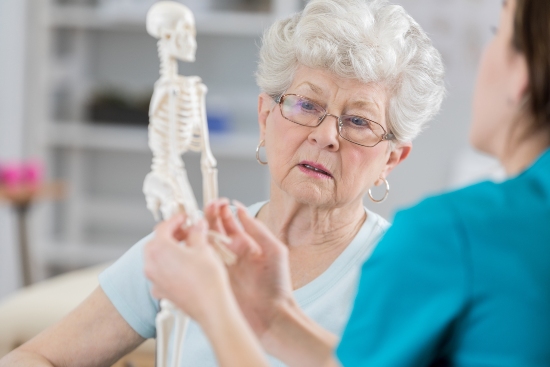Osteoporosis in Fort Collins & Loveland
Professional Osteoporosis Assessment and Osteopenia Treatment
Caring for All Women Always
Did you know that women are four times as likely to develop osteoporosis than men? The risk of osteoporosis also becomes more pronounced past the age of 50. But what is osteoporosis? Osteoporosis is a disease that weakens the bones, making your bones more susceptible to breaks and fractures. Post-menopausal women are especially likely to develop the condition.
At The Women’s Clinic of Northern Colorado, we specialize in osteoporosis prevention and early osteopenia treatment. We provide options because we know the bone health of our patients is never exactly the same. Our caring staff of physicians and nurse practitioners will work with you to find the best course of treatment, and we offer prevention plans to give you a better chance of avoiding the condition altogether. Get in touch with us for more information about our osteoporosis treatment options.
Osteoporosis FAQs
Osteoporosis is a serious condition, and you may have a lot of questions about this disease. The Women’s Clinic of Northern Colorado has prepared some answers to the most common osteoporosis questions.
- Who gets osteoporosis? – It is estimated that 54 million Americans have been diagnosed with osteoporosis. It is a disease that affects both men and women, although women are four times more likely to develop the condition. It is especially common in postmenopausal women.
- What causes osteoporosis? – The living tissue inside your bones is like a sponge. It’s porous, but covered with a hard outer shell. Osteoporosis occurs when the pores inside the spongy section of bone grow and erode the overall density of the bone.
- What are the symptoms of osteoporosis? – There are rarely symptoms noticed by people who develop osteoporosis. However, you should be on the lookout for loss of height, a noticeable change in posture, more labored breathing, and lower back pain.
- How is osteoporosis diagnosed? – Low level x-rays are used to scan your bone density. The process is painless, and only certain bones may need to be scanned.
- How is osteoporosis treated? – Treatment depends on the severity of the condition. Severe bone density loss may require bone-building medications. Bone density loss caused by lack of estrogen may be treated by hormone therapy.
- What medications are involved and when should it be treated? – There are different kinds of medications prescribed for osteoporosis depending on how advanced the condition is. Bisphosphonates, selective estrogen receptor modulators, and dietary supplements may be used to slow bone density loss. Osteoporosis is typically treated with medication when bone density T-scores are under -2.5.
- How can I prevent osteoporosis? – You can give yourself the best chance of avoiding osteoporosis altogether by living a healthy lifestyle. This includes regular exercise (cardio, resistance training, weight-bearing exercise, etc.), eating plenty of fruits and vegetables, limiting alcohol, and quitting smoking. Vitamin D also helps you absorb calcium, so getting sunlight can also help prevent osteoporosis.
Contact Us for Osteoporosis Treatment






